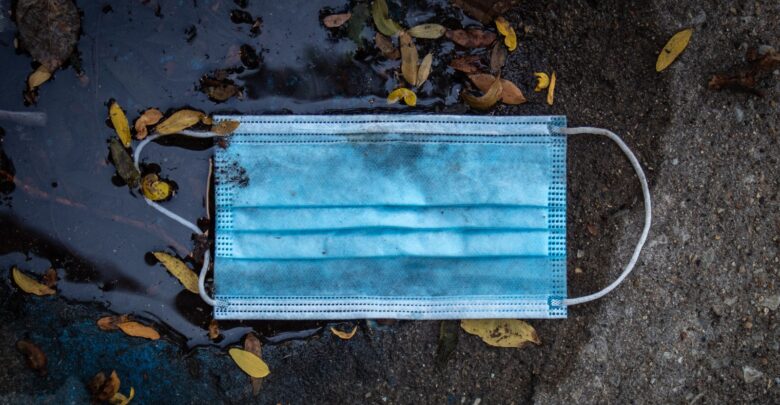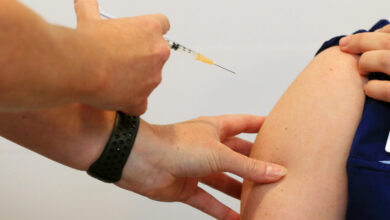

The pandemic prompted a huge increase in both the production of personal protective equipment and a corresponding amount of such gear being discarded. Estimates show that globally, we use about 129 billion face masks and 65 billion gloves monthly.
And with the emergence of new COVID-19 variants, managing how such goods are disposed of is likely to continue to have an impact on the environment.
One possible solution to this problem has been created by an Israeli company.
The Envomed 80, by Maabarot Metal Works, is an on-site machine that reduces medical waste into a safe product that is disposable alongside municipal waste and is environmentally friendly.

In roughly 20 minutes, one Envomed 80 treats up to 550 pounds (250 kilograms) of waste per nine-hour shift, serving nearly 350 hospital beds.
“We were looking for a field in which there’s a scarcity of technical solutions,” says Envomed CEO David Segev. “We came across infectious or medical-waste treatment, and after exploring this market, we identified two problems.”
“First, there is no on-site treatment; it’s all done off site, which makes no sense. Second, that off-site treatment mainly involves incinerators, which is horrible. When we re-explored the market, we found that hospitals don’t process on-site because there’s no adequate alternative.”
The original solutions were mainly heat-treatment technologies — autoclaves. The problem is that “infectious waste carries both liquid and solid phases, which autoclaves cannot tackle,” Segev said.
“The challenge was finding a process that is valid for both solid and liquid waste. Even so, every stream of waste has different materials, so there’s really no way to know exactly what’s going through the machine every time. Also, hospitals are highly regulated institutes that don’t like uncertainty. We needed to design a solution that would have repetitive and valid infectious waste sterilization results for both solids and liquids.”
Shreds and sterilizes
The Envomed 80 first shreds the waste, reducing volume up to 80 percent before fully sterilizing the collected materials to STAATT (State and Territorial Association on Alternate Treatment Technologies) Level IV.
“Our machine uses a strong oxidizer, so the efficiency is high,” says Segev. “After the activation stage agitates the shredded waste with the sterilization agent, the outcome yields both solids and liquids. From there we have a liquid and solid separator where the liquid will go directly to the sewage, because at that point it will dissolve into water, oxygen, and acetic acid, so it’s totally eco-friendly. The solid product will later be dried, leaving a confetti-shaped municipal-grade waste product.”
During the sterilization step, the materials undergo rigorous agitation using a powerful oxidizer combining peracetic acid and hydrogen peroxide. It can attack all cell components, like proteins and enzymes, to fight bacterial spores.
Leaving zero live pathogens behind, the Envomed 80 eliminates the need for off-site management, bringing with it the reassurance of safety and hygiene within healthcare facilities, says Segev.
The company has begun pilots in Asia-Pacific and European countries with installations in progress in Israel with Clalit Health Services, one of largest HMOs in the country.
“We have machines in Soroka Medical Center in Beersheva, and we’re installing more in Beilinson Hospital in Petah Tikva,” says Segev. “There’s also some installations in Scandinavia. Installing our machinery in these places is relatively easy for us because they’re all fairly sustainable countries, so they can appreciate our technology.”
Although current practices and regulations of waste management are suited for off-site solutions, Segev believes the Envomed 80 has the potential to pave the way for other initiatives in waste management as installations proliferate.
“If you have good technology, it makes no sense to treat [waste] off-site. It makes more sense to treat it immediately at the place where it was generated.”

One step further
“When you have an on-site instrument, it’s really helpful in avoiding pileups of waste,” he said. “Especially during the pandemic, there’s no everyday waste pick-up service, so waste pileups become very dangerous. When you have the instrument at the site, you are not beholden to pick-up services, so there’s closure in knowing how the waste is managed.”
However, the Envomed 80 alone cannot reverse the damage caused by the COVID-19 pandemic and the medical waste problem it exacerbated.
“We need to take things one step further,” Segev says. “In Israel now, municipal-grade waste ends up in landfills. We are trying to take things one level higher by recycling it. Let’s take the waste product and make something of it.”
“A remedy for the growing epidemic of medical waste” first appeared in Israel 21c.
The post A Remedy For The Growing Epidemic Of Medical Waste appeared first on Zenger News.




